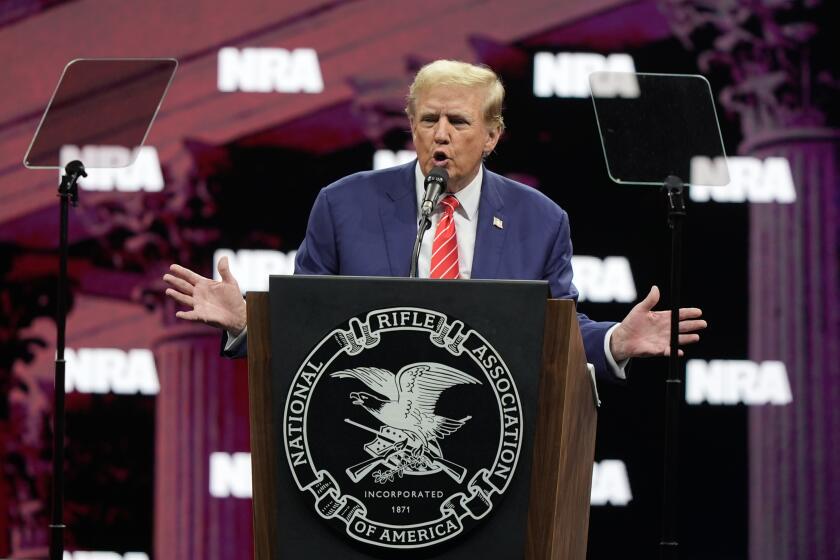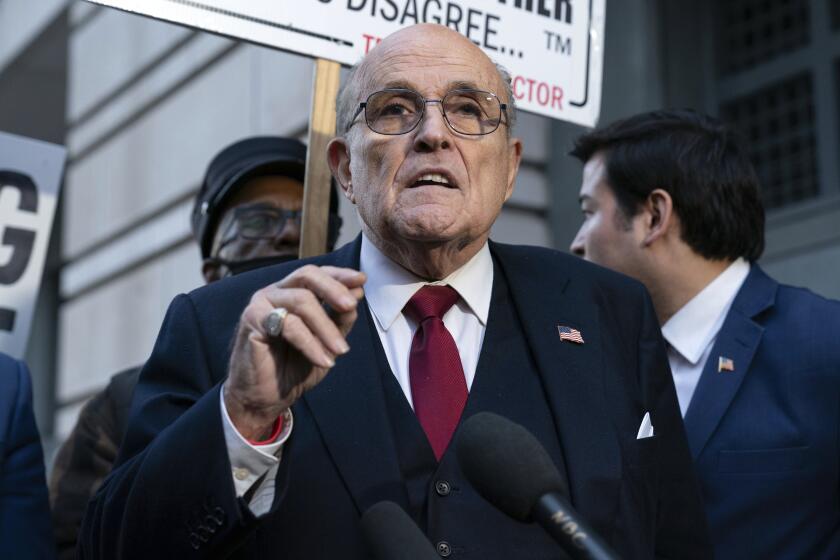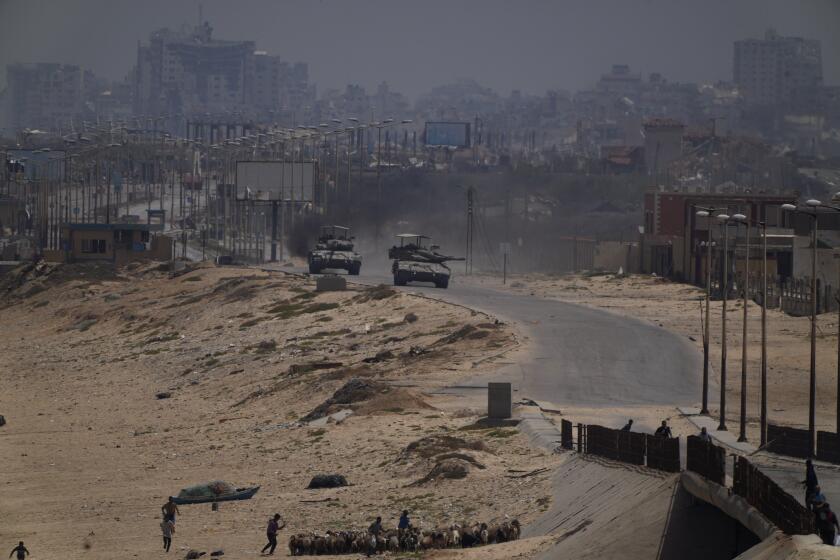Sunni Factions Plot Their Return
At the office of the federation of Iraqi tribes, the scene is something of a throwback to the Saddam Hussein days.
Along the walls sit more than a dozen mustachioed men with military bearing, several recognizable as former Baathist army and intelligence officers. At a big desk sits their leader. A request for a private interview is waved off -- we have no secrets, he says.
But instead of giving orders for battle as they might have in years past, the men this time are preparing for an altogether different kind of campaign. Most Sunni Arabs boycotted the parliamentary elections in January, but this week they will vote in large numbers, declares Hassan Zeidan, once a senior Baath Party general.
Will that mean an end to the Sunni-driven insurgency, believed to be led by former Baathist officers like the men staring grimly in this room?
No, is the immediate answer. “As long as our country is occupied, the resistance will continue.” In other words, Sunni Arabs loyal to the old regime will vote, and they will keep fighting.
Angered by the continued presence of U.S. forces and what they see as unfair dominance of Iraq’s military and police by the country’s majority Shiites, many Sunnis hope to claim a greater share of political power. But many former Baathists among them see voting as a pragmatic move. It does not necessarily mean they are buying into the new political system, as U.S. officials insist.
On Thursday, Iraqis will choose their first permanent government since the U.S. invasion, putting into practice the constitution approved in October. It will be the third national vote in Iraq in less than a year, and in many ways the most important.
Many Sunnis have had a remarkable change of heart about election participation, although the influential Muslim Scholars Assn. continues to stand aloof from the process and the most radical segments of the insurgency -- die-hard Hussein loyalists and followers of Al Qaeda and Abu Musab Zarqawi -- continue to threaten violence.
U.S. officials have pointed out that 10 million people voted in the constitutional referendum, 2 million more than in the first election of a transitional parliament in January. The White House is counting on an even higher turnout this time, with significant Sunni numbers, as evidence that the U.S.-sponsored transition to democracy is working.
With calls for a troop withdrawal rising in the U.S., some also see in the election a possible turning point that would allow American and British forces to begin to pull out of Iraq with dignity next year.
But that possibility depends on whether the elections actually usher in a government that will have the backing of a broad spectrum of all of the main ethnic, regional and sectarian groups in Iraq.
So far, Sunnis who were the most loyal to Hussein, and who felt they had the most to lose in the new governing arrangement empowering Shiites and Kurds, have been the main holdouts against the new government.
Zeidan, 57, who has twice been detained and released by U.S. forces, has been barred from running as a candidate because of his Baathist affiliations. But that does not matter, he said. His son will be among the candidates on the slate of the Iraqi National Dialogue Front, one of the Sunni coalitions, along with other individuals deemed reliable.
“The candidates we nominated are all good, patriotic elements who aim to serve Iraq and the Iraqis,” he said. And those barred from running, he said, “will lead the National Assembly from the outside.”
Zeidan declined to predict how many seats his and other “patriotic” Sunni groups would win, but made it clear that he thought the number would be significant.
After the elections, he said, the Sunni groups would seek to enter into alliances to try to deny power to the current Shiite-led coalition under Prime Minister Ibrahim Jafari. Possible allies, he said, include the Kurdish parties and the followers of former Prime Minister Iyad Allawi, a secular Shiite who was once a Baathist.
He said that if elected, the Sunnis would press for an early U.S. withdrawal from Iraq, and push for added constitutional changes to unify the country and reduce the chances that Iraq could break apart along ethnic and sectarian lines.
Zeidan expressed confidence that his vision would win wide backing.
“Believe me, whoever is supported by the Baathists in the next election will win, because more than 90% of the Iraqi people were Baathists,” he said.
Sunni Arabs make up about 20% of the Iraqi population.
Western officials, pointing to fragmentation among Sunni Arabs, have been encouraging the Sunni parties. The officials have shown little anxiety that the newly emerged alliances may in some instances be standing in for the former Baathists. Sunni Arabs were the dominant group in the time of Saddam Hussein, but they are believed to be the majority in only three of Iraq’s 18 provinces.
Even if they vote as a bloc, the most the Sunnis can hope for is to be a strong minority, with perhaps 40 seats in the 230-member assembly. The transitional parliament chosen in January included only a handful of Sunni Arabs, mostly returned expatriates who had been in exile during Hussein’s rule.
This time around, at least three main Sunni blocs are contesting the elections: the Iraqi Consensus Front, whose biggest component is the Iraqi Islamic Party, a 45-year-old conservative Islamic party suppressed by Hussein that began as an offshoot of Egypt’s Muslim Brotherhood; the Iraqi National Dialogue Front, led by Saleh Mutlak and Zeidan, the group closest to the former Baathists and Hussein’s military; and the Liberation and Reconciliation Bloc led by Mishaan Jaburi.
At the Iraqi Islamic Party’s complex in Baghdad’s upscale Mansour neighborhood, activists have been busy preparing posters and going out to towns and villages to encourage people to vote.
Inside, next to a small mosque, the party has set up an operations center with a bank of computers to draft pamphlets and coordinate its message.
Like other parties in Iraq, a worker at the Iraqi Islamic Party said, his group has been learning about nuts-and-bolts election tactics and strategies at workshops from U.S.-funded democracy-building groups.
“We plan to go house to house and door to door, and we have thousands of workers,” said the campaign aide, declining to give his name for security reasons. “But we will not use mosques for our propaganda -- the election rules forbid it.”
It is a strategy not without cost. A number of campaigners and Sunni politicians have been assassinated in recent weeks, although it is not always clear whether their killers are members of the Sunni resistance who reject elections, or sectarian rivals loyal to the now-dominant Shiite coalition.
“There has clearly been a break between people who have a Baathist ideology and therefore see themselves as having no choice but insurgency against this government, and those who decided to take part in the elections,” observed one U.S. official here, speaking on the condition of anonymity.
Most of the Sunni groups remain highly critical of Iraq’s new constitution and are eager to rid the country of U.S. influence. But the fact that they are deciding to participate matters more than their reasons, the official suggested.
“Their goals are very clearly within the government. They want more control of the Interior Ministry. They want more control of the Defense Ministry,” he said. “In many ways, they are recognizing the state’s monopoly on force -- they just want more of a share of it. So I think there is a strong hope that they are trying to integrate themselves into the state.”
Marwan Mohammed, a Sunni Arab who owns a cellphone shop on downtown Baghdad’s Rabi Street, reflects the ambivalence felt by many Sunnis.
“I think the elections are going to go through, whether I like it or not,” he said. “So I think it is important to participate.”
Mohammed Jumeili, 28, a Baghdad worker from the insurgency-embroiled Al Anbar province, said he boycotted the elections in January, but this time will vote for a Sunni slate “because the current government marginalized some people and treated them in a sectarian way. I will choose on a sectarian basis. This is the least I can do.”
Sunni Arabs in Iraq are also being urged by Arabs in surrounding countries to vote, to prevent a key Arab country from falling under complete Shiite (and perceived Iranian) domination.
Among them has been the influential Egyptian Sheik Yusuf Qaradawi, considered a spiritual leader for the international Muslim Brotherhood.
“I call upon the Sunnis to participate en masse. It is not forbidden.... Necessity makes it permissible!” he said last week.
*
Times staff writers Borzou Daragahi and Shamil Aziz and special correspondent Asmaa Waguih contributed to this report.
More to Read
Start your day right
Sign up for Essential California for news, features and recommendations from the L.A. Times and beyond in your inbox six days a week.
You may occasionally receive promotional content from the Los Angeles Times.






